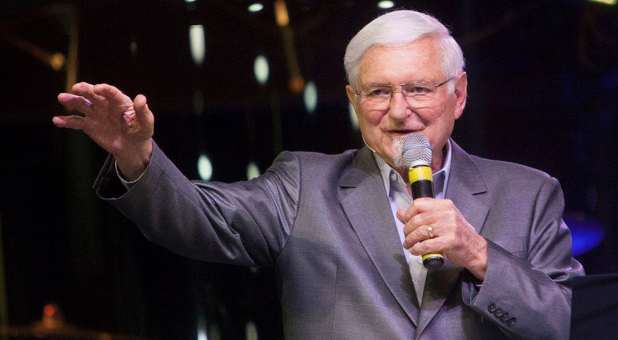An Honest Question for Critics of the New Apostolic Reformation
This article is not meant to provoke or insult or demean or antagonize or gaslight. Instead, it is meant to help readers understand why I continue to say that the New Apostolic Reformation of the critics does not exist.
Remember that I freely acknowledge the existence of the New Apostolic Reformation as articulated by Peter Wagner and, in certain ways, spearheaded by him.
I freely acknowledge that I have been a member and leader in the U.S. Coalition of Apostolic Leaders, but only after the name was changed from “Apostles” to “Apostolic Leaders,” which was subsequent to Wagner’s involvement.
I freely acknowledge that I believe in the ongoing ministry of apostles and prophets in the church, holding to the view that there have been apostles and prophets operating in the church throughout history, even if not called by those names.
I freely acknowledge that I am friends with men like Lou Engle, Randy Clark and Sid Roth.
I freely acknowledge that I am an unashamed Pentecostal-charismatic, that I have spoken in tongues since Jan. 24, 1972, and that I will gladly debate any qualified leader or scholar on the continuation of the gifts of the Spirit.
Why, then, do I say that the NAR of the critics is fiction?
I’ll do my best to explain.
On Dec. 12, I’m scheduled to interview historian Matthew D. Taylor on my “Line of Fire” broadcast.
Taylor is one of the hosts of the podcast called “Charismatic Revival Fury: The New Apostolic Reformation,” as well as the author of a forthcoming book “The Violent Take It by Force: The Christian Movement that Is Threatening Our Democracy.” He believes there is a direct connection between the events of Jan. 6 and the NAR founded by Wagner.
That’s what we’ll be focusing on in our interview, and while we definitely have some profound differences, we do share a number of common (and serious) concerns.
Interestingly, in light of his investigative research, which included direct access to Wagner’s archives (including personal emails and much more), Taylor has come to recognize that I am not part of NAR. He also recognizes that men like Randy Clark are not part of NAR. And, like me, he takes issue with the scholarly methodology of some of the principal critics of the wider NAR, while acknowledging some nuggets of truth in their work, as I also do.
In Dr. Taylor’s own words, if you search online for NAR, “You’ll find websites with literally thousands of names indexed of different Christian leaders who are supposedly part of ‘the NAR.’ … You will find writing about the New Apostolic Reformation that sounds like stuff out of a bad conspiracy novel—where NAR leaders are spookily manipulating political leaders like some sort of Charismatic Illuminati.”
He adds, “You will also find people, reputable people, journalists, scholars, people who’ve done their research, pushing back and saying, ‘Yes, there is such a thing as the NAR’ and they can marshal a lot of evidence, much of it coming from Peter Wagner’s writing and associations.”
It is the former NAR whose existence I deny, the NAR that has become the charismatic boogeyman lurking behind every controversial tree, the global network allegedly numbering hundreds of millions of Christians, poised to take over the world. It is the NAR that is described so differently by different critics that many of the descriptions are mutually contradictory.
To cite one example out of many, one critical website claims to offer “The Six Hallmarks of a NAR Church.” These are:
1. Apostles. “We’re in a ‘Second Apostolic Age.’ There are new Apostles on the earth today, anointed by the laying of hands to represent and speak for God here on Earth. These ‘Super Apostles’ are equal to the original Apostles—the ones who witnessed Jesus’ life, death and resurrection and were appointed by Christ Himself to the office. Since these new apostles are commissioned by God, their authority may not be questioned.”
Personally, I don’t know a single apostolic leader who claims to be equal to the original apostles, and I don’t know any who claim their authority cannot be questioned. In all circles I work with, such attitudes would be flatly rebuked. Yet we’re told this is the very first hallmark of a NAR church. Some “apostles” might claim this kind of authority, but that would exclude all the leaders I partner with.
2. Kingdom. “Rather than preach the Gospel of the cross, Apostolic leaders are working to bring the Gospel of the Kingdom of Heaven to Earth. They do this by taking dominion of earthly kingdoms or ‘mountains’ of government, media, entertainment, education, business, family and religion. Leaders often talk of city building and organize prayer walks to pray against demonic strongholds. They often speak of being mission-focused rather than being Christ-centered.”
This too is a gross exaggeration, although some of it is true in terms of dominion theology, a theology I strongly reject. What is false here is the notion that NAR leaders are not Christ-centered and do not preach the gospel of the cross. It’s also false to group under NAR those churches that believe in prayer walks, that speak of being mission focused (which does not mean they are not Christ-centered) and that believe in praying against demonic strongholds. That takes in a wide variety of quite unrelated churches and movements.
I think you can already see how these descriptions are, on the one hand, way too vague, and on the other hand, highly exaggerated. How does this help someone genuinely seeking to understand the meaning of NAR?
Sign up NOW for a FREE Charisma Magazine Online 30-day trial!
3. Destiny. Presence. Glory. “Though members are not always charismatic, they frequently emphasize a manifestation of ‘Glory’ and ‘God’s presence,’ and often have a special anointing to receive direct revelation from God, perform healings and other signs and wonders. They teach that our purpose is to achieve our dream destiny so that we can change the world.”
Did you get that? If you emphasize God’s presence in your corporate services or your private prayer life, you’re probably NAR. If you believe the Spirit is still speaking and healing, you’re probably NAR. If you believe that God wants to use you, as a follower of Jesus, to be a world changer, you’re probably NAR.
Once again, you can see how utterly unhelpful and confusing such definitions are, especially when you remember that day and night, we hear about the dangers of NAR.
4. Revival. “Revival on a massive scale is key in this movement. There is a strong emphasis on an ‘end times harvest’ through a great awakening that we can usher in. Often these revivals are held in stadiums and reach millions around the world via live stream technology; they are marketed and produced like rock concerts. All Scripture verses about an end times falling away are ignored, and get replaced with hyped-up claims about the ‘Next Big Thing’ that’s always just around the corner.”
Again, aside from gross exaggerations, such as, “All Scripture verses about an end times falling away are ignored,” this description indicts countless thousands of churches worldwide that have been praying for revival and believing for a great end-time harvest for decades (even while recognizing that there will be falling away as well). This also indicts the hundreds of millions of believers who have prayed and believed for revival and a great end-time harvest throughout church history. This also indicts much of the world missions movement, along with many postmillennialists who are even anti-charismatic.
Uniquely NAR? Hardly.
5. Unity. “Unity (at the expense of biblical doctrine) is almost always used as both the how and the why in this movement. Unity for the sake of bringing Heaven to Earth is leading to the blurring of doctrinal and denominational lines, often bringing together well-known leaders of charismatic, reformed, Word of Faith, seeker-emergent, progressive and Roman Catholics [sic] churches, all under one umbrella.”
Again, I don’t work with anyone who believes in unity at the expense of essential doctrines. But hopefully we all believe in unity around Jesus despite secondary doctrinal issues. As for this being a description of NAR, notice now that this becomes the umbrella for “well-known leaders of charismatic, reformed, Word of Faith, seeker-emergent, progressive and Roman Catholics churches.” It looks like everything is NAR!
6. NAR denies the sufficiency of Scripture. “NAR adherents may believe in the inerrancy and authority of the Bible, but God’s breathed-out Word is just not enough for them. Jesus’ sacrificial death for our sins is not good enough; the promise of eternal life in Heaven is not good enough.”
Having served the Lord now for the last 52 years, having worked with hundreds of thousands of leaders and believers worldwide, having ministered outside the United States on roughly 200 trips along with preaching throughout America, having taught at dozens of ministry schools and seminaries, to my knowledge, not a single person I have worked with would affirm this statement. Yet, we’re told, this is a hallmark of a NAR church.
The truth be told, I don’t personally know a single church that would affirm all six of these alleged hallmarks. Of what use are they?
You might say, “But you’re cherry picking. You chose a ridiculous, hypercritical website rather than a reliable one.”
I would reply that, first, plenty of people do believe what is on this site, and second, how does one know which is the real NAR and which is not, or who are the reliable critics and who are not?
So, once again, I come back to my initial question.
Why do I deny the existence of NAR (let alone by being an alleged leader in NAR) when I so freely affirm apostolic ministry today, when I recognize the existence of Wagner’s NAR and when I am an unashamed Pentecostal-charismatic?
It is because the NAR of the critics is a fiction, and a dangerous one at that. For that reason, my appeal remains the same.
Ditch the unhelpful terminology; give up the exaggerated, fearmongering, click-bait posts and focus on actual abuses and problems. Then we can get some constructive work done for the glory of God and the good of His people. {eoa}
Join Charisma Magazine Online to follow everything the Holy Spirit is doing around the world!







































